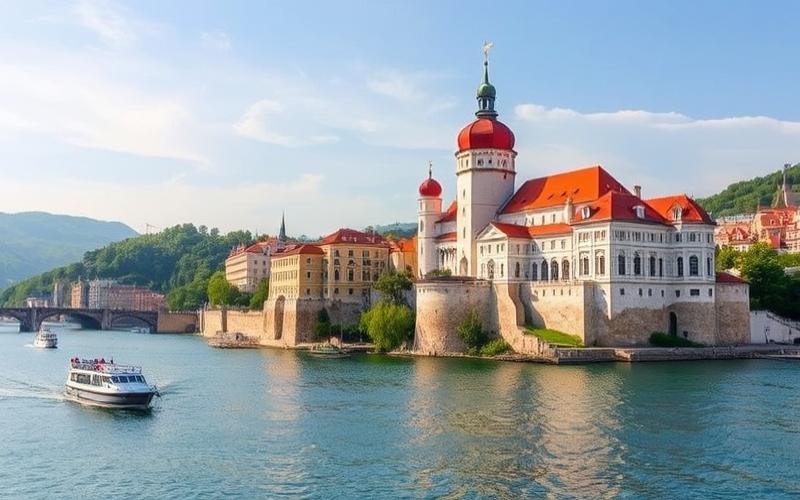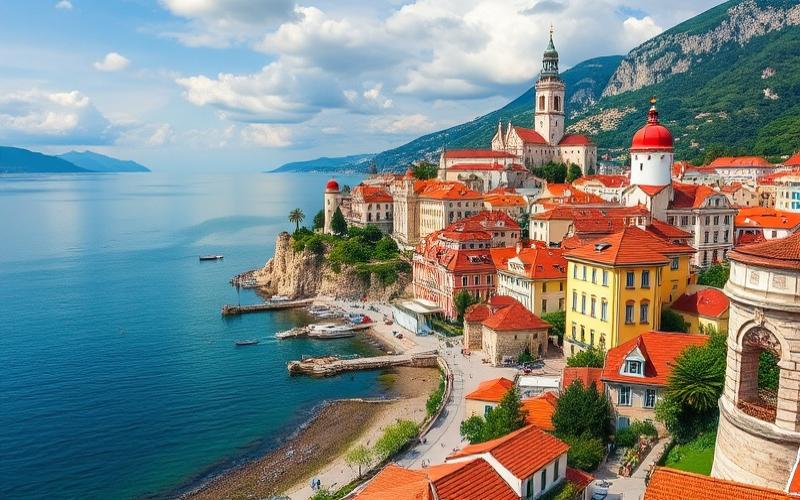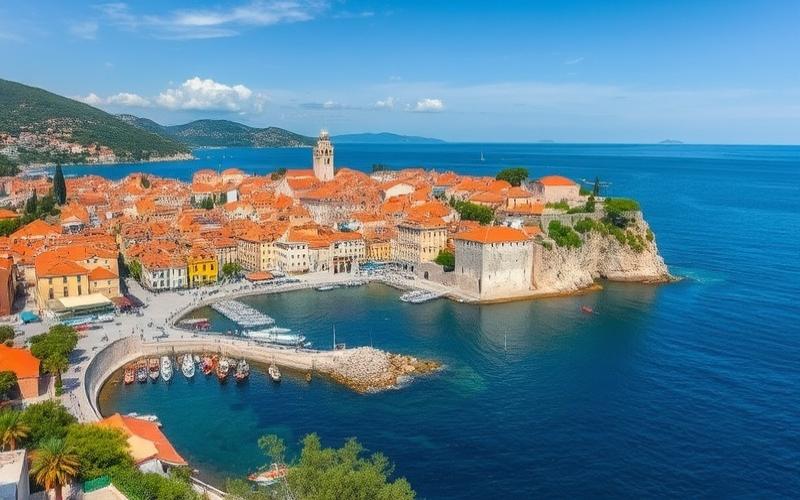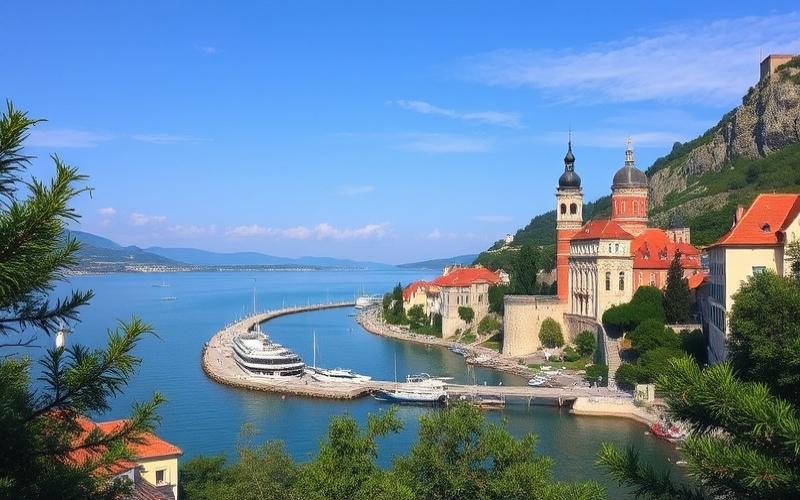
 Published on and written by Cyril Jarnias
Published on and written by Cyril Jarnias
Investing in Croatian real estate represents a unique opportunity for expatriates seeking to diversify their portfolio while enjoying stunning coastal landscapes and an enviable Mediterranean climate.
With prices still relatively affordable compared to other European destinations, the Croatian market offers numerous possibilities, ranging from modern apartments in Zagreb to charming stone villas on the Dalmatian islands.
Furthermore, recent infrastructure development and tourism growth have made Croatia a sought-after destination, ensuring attractive potential profitability for rental investments.
However, to effectively navigate regulations and take advantage of available tax benefits, it’s essential to thoroughly understand the legal and economic framework of this growing nation.
Understanding the Legal Framework for Real Estate Investment in Croatia
Legal Framework for Real Estate Investment in Croatia
Laws Governing Expatriate Purchases and Restrictions
- EU/EEA citizens can acquire most residential and commercial properties in Croatia under the same conditions as Croatians, but cannot purchase agricultural or forest land.
- Non-EU nationals must obtain prior approval from the Ministry of Justice, subject to the reciprocity principle: a Croatian citizen must be able to purchase real estate in the buyer’s home country under similar conditions.
- Foreign companies can acquire real estate, often without restrictions, but consulting a local attorney for the procedure is recommended.
- Certain property categories (agricultural, forest) are subject to stricter restrictions for foreigners, except when acquired through a Croatian company.
| Nationality / Status | Purchase Procedure | Main Restrictions |
|---|---|---|
| EU/EEA Citizens | Simplified procedure | No purchase of agricultural or forest land |
| Third-Country Citizens (non-EU) | Ministry approval required | Reciprocity agreement mandatory |
| Foreign Companies | Purchase via local company possible | Different procedure, advice required |
Legal Steps for Property Purchase
- Eligibility verification (references to nationality and reciprocity agreements)
- Obtaining approval from the Ministry of Justice for non-EU citizens (if necessary)
- Signing a preliminary contract and paying a deposit (typically 10%)
- Verifying the property’s legal status: consult the land registry to ensure the property is free of debts or encumbrances
- Signing the sales deed before a notary public (mandatory)
- Registering the property with the Croatian land registry to formalize the transfer
- Paying the real estate transaction tax (see below)
Tax Obligations and Legal Fees
- Property transfer tax: 3% of the property value, payable by the buyer
- Notary fees: variable depending on property value and transaction complexity
- Attorney fees (recommended but not mandatory)
- Land registry registration fees
- Opening a local bank account recommended to facilitate transactions
Legal Protections for Buyers
- Obligation to verify that the seller is the registered owner and that the property is free of any debt or mortgage
- Croatian legislation requires all property transfers to be registered in the land registry, ensuring legal security for the purchaser
- Mandatory involvement of a notary public to authenticate the transaction and prevent fraud
Bilateral Agreements and Their Impact on the Purchase Process
- The reciprocity principle applies to non-EU nationals: Croatia must have an agreement in effect with the buyer’s home country
- List of countries with which Croatia applies reciprocity available from the Ministry of Justice
- For U.S. citizens, reciprocity depends on the state of origin and must be verified case by case
- Citizens of countries without reciprocity agreements must establish a Croatian company to invest
Good to know:
In Croatia, expatriates must register their property purchase with the Croatian land registry and engage a notary for the transaction; specific taxes apply, and bilateral agreements can either facilitate or complicate the process depending on the buyer’s country of origin.
Administrative Procedures for Property Purchase as an Expatriate
Legal Framework and Restrictions for Foreign Property Purchase in Croatia
EU/EEA citizens enjoy nearly identical access to Croatians for purchasing residential real estate (apartments, houses, buildable land), except for agricultural and forest land, which remain inaccessible for direct purchase.
Non-EU/EEA citizens must:
- Obtain prior approval from the Croatian Ministry of Justice.
- Verify the existence of a reciprocity agreement between Croatia and their home country.
- Respect the moratorium on purchasing agricultural and forest land (only exception: through a company registered in Croatia).
| Property Type | EU/EEA Citizens | Non-EU/EEA Citizens |
|---|---|---|
| Apartments, houses | Yes | Yes, under conditions |
| Buildable land | Yes | Yes, under conditions |
| Agricultural/forest land | No | No |
Legal Steps to Finalize the Purchase
- Obtaining a Croatian tax identification number (OIB): essential for any real estate transaction.
- Property search and selection.
- Signing a preliminary contract (deposit of approximately 10% of the price).
- Legal verification of the title deed by a local attorney (ownership, absence of debts, land registry registration).
- Signing the sales contract before a notary.
- Applying for purchase approval (for non-EU/EEA) from the Ministry of Justice.
- Paying the balance and associated taxes.
- Registering the property transfer with the land registry.
- Obtaining the property certificate (vlasnički list).
Required Documents
- Passport or ID card
- OIB (Croatian tax number)
- Notarized sales contract
- Proof of payment (deposit, balance, taxes)
- Prior approval from the Ministry of Justice (for non-EU/EEA)
- Proof of citizenship/residence
- Seller’s declaration of sale
- Proof of financing (bank statement, proof of funds)
Taxes, Duties and Associated Fees
| Fee or Tax | Amount or Rate |
|---|---|
| Property transfer tax | 3% of the value (resale) |
| VAT (new constructions) | 25% (included in price) |
| Legal fees (attorney) | 1–1.5% of property price |
| Notary fees | €500–€1,000 |
| Real estate agent commission | 3% (shared or buyer) |
| Annual property tax | Low, depends on municipality |
| Rental income tax | Flat rate 10% + surtaxes |
Additional certified translation fees may apply if documents are not in Croatian.
Practical Tips for Expatriates
- Work with a local attorney specializing in real estate law to secure the transaction and ensure document compliance.
- Systematically verify the seller’s identity and absence of debts or encumbrances on the property.
- Prefer properties already registered in the land registry to simplify property transfer.
- Open a Croatian bank account to facilitate local payments and tax management.
- Anticipate longer processing times for non-EU/EEA citizens (2 to 4 months versus 30 to 45 days for EU nationals).
- Research local tax specifics, particularly if renting out the property.
Key takeaway:
Property purchase in Croatia for expatriates is possible but highly regulated.
Professional assistance (attorney, notary, accredited agent) and thorough verification of titles and compliance are essential to avoid disputes and ensure transaction validity.
Good to know:
Foreigners must obtain a Croatian tax number and verify the property’s legality before purchase; assistance from a local attorney can facilitate this process. Budget for acquisition taxes, notary and translation fees, and ensure you have a residence permit during the transaction.
International Financing Strategies and Tax Implications for Non-Residents
Funding Sources for Expatriates Looking to Invest in Croatian Real Estate
| Financing Option | Advantages | Disadvantages |
|---|---|---|
| Bank loan in home country | Known conditions, speed, easier management, currency stability, often lower rates | Often requires collateral on existing property in home country, access limited to creditworthy borrowers |
| Bank loan in Croatia | Possible for non-residents, direct access to local market | Restrictive access, high requirements (substantial down payment, stable income), sometimes higher rates, administrative complexity |
| International banks | May facilitate credit access for expatriates with existing international banking relationships | Often conditional on opening a local account or providing specific guarantees |
| Investment funds | Risk pooling, professional management, access to large-scale projects | Management fees, less direct control, variable returns |
| Partnerships | Risk sharing, complementary skills and capital | Legal complexity, need for solid contractual agreement |
| Crowdfunding | Access to projects without significant initial investment, possible diversification | Project risk, uncertain returns, sometimes less protective legal framework |
| Personal financing (equity) | Speed, freedom of action, no debt | Mobilization of significant liquidity, lost leverage opportunity |
Advantages and Disadvantages of Main Options
- Bank loan in home country: preferred solution for most European expatriates, as it avoids local legal and banking complexities while benefiting from attractive rates and stable currency. Real estate in the home country often serves as collateral.
- Bank loan in Croatia: possible but difficult to access for non-residents. Croatian banks typically require substantial down payments and stable income. Interest rates are sometimes higher than in other EU countries.
- Investment funds and crowdfunding: suitable for investors wanting to diversify their portfolio without directly managing a property. However, control is limited and project-specific risks must be assessed.
- Partnerships: useful for pooling resources and sharing risks, but require robust contractual structure and trust between partners.
- Personal financing: used by investors with available liquidity, which simplifies acquisition but limits ability to invest in multiple projects simultaneously.
Tax Implications for Non-Residents in Croatia
| Operation | Croatian Tax Regime |
|---|---|
| Purchase | Real estate acquisition tax: 3% of purchase price, payable after property registration |
| Ownership | No annual property tax for primary residence. For secondary residences: municipal tax of €0.50 to €2/m²/year depending on municipality |
| Rental income | Taxable in Croatia. Mandatory declaration, variable rates depending on chosen tax regime |
| Sale | Capital gains taxable if property sold less than 2 years after purchase (except for exceptions). Possible exemption if property held more than 2 years and not rented during this period |
– No inheritance tax for children and spouses in direct line.
Bilateral Tax Treaties
- Croatia has signed tax treaties with many European and non-European countries to avoid double taxation.
- These treaties determine which country has the right to tax income (e.g., rents and capital gains) from real estate located in Croatia.
- Under most treaties, primary taxation of real estate income occurs in the country where the property is located (here, Croatia). The expatriate’s country of tax residence may also tax this income, but must grant a tax credit or exemption to avoid double taxation.
Practical Tips for Tax Optimization
- Research the specific tax treaty between Croatia and your country of tax residence to anticipate taxation on rental income and capital gains.
- Maintain precise tax records and keep all acquisition, expense, and income documentation.
- Consider holding the property through an appropriate structure (personal or corporate) based on wealth and tax strategy.
- Include notary, registration, and local tax fees in the real estate investment profitability calculation.
- Always consult a tax advisor specializing in international taxation to optimize the holding structure and income declaration, and to anticipate any regulatory changes.
Important: International real estate taxation is complex. Assistance from a professional mastering both Croatian legislation and the expatriate’s country of residence is essential to avoid costly errors and secure the investment.
Good to know:
Expatriates can utilize international bank loans, investment funds, and crowdfunding platforms to invest in Croatia, each with different tax implications to consider, particularly through bilateral tax treaties that can reduce taxation; always consult a tax advisor to navigate these complexities and optimize tax benefits.
Disclaimer: The information provided on this website is for informational purposes only and does not constitute financial, legal, or professional advice. We encourage you to consult qualified experts before making any investment, real estate, or expatriation decisions. Although we strive to maintain up-to-date and accurate information, we do not guarantee the completeness, accuracy, or timeliness of the proposed content. As investment and expatriation involve risks, we disclaim any liability for potential losses or damages arising from the use of this site. Your use of this site confirms your acceptance of these terms and your understanding of the associated risks.
























